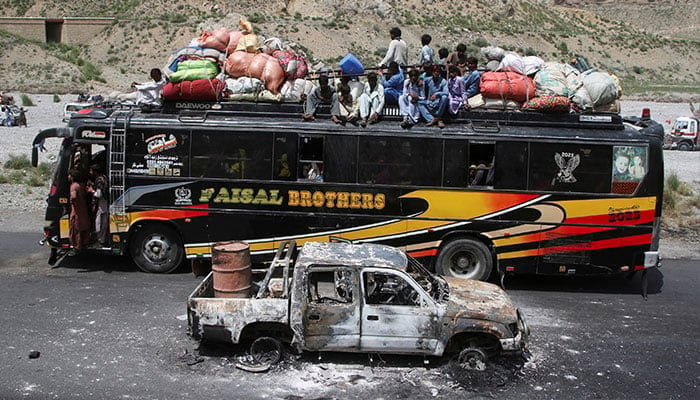Terror stats
Data shows counterterrorism operations led to killing of 341 terrorists, but sheer scale of threat remains overwhelmingly high
In a sobering update presented to the National Assembly, the Ministry of Interior has revealed that Pakistan has experienced a staggering 1,566 terrorist incidents during the first 10 months of the ongoing year. These attacks have resulted in the tragic loss of at least 924 lives, including those of civilians and law-enforcement personnel. The data further indicates that counterterrorism operations led to the killing of 341 terrorists, but the sheer scale of the threat remains overwhelmingly high. Meanwhile, a report from the Ministry of Defence has highlighted Pakistan’s unique position as the frontline state against terrorism emanating from Afghanistan, bearing the brunt of terrorist activity linked to groups such as the TTP and ISIS-Khorasan (Daesh), with no other nation facing as severe an onslaught from these groups. The costs of this prolonged conflict are staggering: more than 90,000 casualties, direct economic losses amounting to $152 billion, and indirect losses estimated at $450 billion. The situation in Afghanistan, particularly following the Taliban’s return to power, has allowed terrorist groups increased freedom of movement, compounded by access to sophisticated military equipment left behind by the US. These reports paint a grim picture of the security landscape in Pakistan, one that is increasingly threatened by both local insurgents and cross-border militancy.
However, the most alarming aspect of this situation is the lack of national attention given to the escalating threat of terrorism. Over the past two years, political chaos has dominated the discourse in Pakistan. Political elites have focused on power struggles, undermining efforts to tackle the real existential threat: terrorism. With more than 900 lives lost to terrorism-related violence in just 10 months, it is unconscionable that the political class continues to be consumed by internal disputes. Instead of prioritising national security, the country’s leaders have spent months embroiled in political wrangling. This political dysfunction has prevented the kind of coordinated national response needed to effectively combat terrorism. The recent events in Khyber Pakhtunkhwa, whose provincial chief executive stormed the capital in defiance of the central government, are a stark example of how political priorities have been misplaced. The lack of cooperation between the federal government, provincial authorities, and law-enforcement agencies exacerbates the problem.
Pakistan has long raised concerns about the Afghan Taliban’s unwillingness to take action against groups like the TTP, which continue to operate from Afghan soil. Despite repeated warnings from Pakistan, the Afghan Taliban regime has shown little interest in addressing the threat posed by these militant groups. The rise of terrorism in Pakistan following the fall of Kabul is not coincidental; it is a direct consequence of the Taliban’s refusal to act against the very groups that threaten Pakistan’s stability. The international community must apply pressure on the Afghan Taliban to put an end to cross-border terrorism and dismantle terrorist networks operating within Afghanistan. If left unchecked, the consequences of this escalating conflict could reverberate far beyond Pakistan’s borders. This rising tide of terrorism demands a unified, comprehensive response from all political factions, law-enforcement agencies, and security forces. Terrorism is not a political issue – it is a national security crisis. Until Pakistan’s leaders place the fight against terrorism at the top of the national agenda, the country will continue to suffer from its devastating consequences.
-
 Eric Dane's Costar Under Fire For Hurling Accusations At Him After His Death
Eric Dane's Costar Under Fire For Hurling Accusations At Him After His Death -
 Queen Camilla Greets The Paddington Bear At BBC’s 500 Words Grand Final
Queen Camilla Greets The Paddington Bear At BBC’s 500 Words Grand Final -
 Chinese Astronauts Finally Reveal Why Spacecraft Left Them ‘stranded’ For 437 Days In Space
Chinese Astronauts Finally Reveal Why Spacecraft Left Them ‘stranded’ For 437 Days In Space -
 Sinitta Makes Shock Admission About Marriage To Andy Willner Post Simon Cowell Heartbreak
Sinitta Makes Shock Admission About Marriage To Andy Willner Post Simon Cowell Heartbreak -
 Bill Gates Calls Ties To Jeffrey Epstein 'huge Mistake,' Reveals Past 'affairs'
Bill Gates Calls Ties To Jeffrey Epstein 'huge Mistake,' Reveals Past 'affairs' -
 Switzerland Announces One-time Compensation For Swiss Bar Fire Victims
Switzerland Announces One-time Compensation For Swiss Bar Fire Victims -
 Ryan Coogler Shares Thoughts About Building Community Of Actors Amid 'Sinners' Success
Ryan Coogler Shares Thoughts About Building Community Of Actors Amid 'Sinners' Success -
 Heidi Klum Gushes Over Diplo Collab 'Red Eye' Despite DJ Falling Asleep During Video
Heidi Klum Gushes Over Diplo Collab 'Red Eye' Despite DJ Falling Asleep During Video -
 Israel Behind Majority Of Journalist Deaths Worldwide, Watchdog Claims
Israel Behind Majority Of Journalist Deaths Worldwide, Watchdog Claims -
 'It Would Become A Circus' : Inside Jane's Turmoil For 'little Sister' Fergie Whose Hidden From The World
'It Would Become A Circus' : Inside Jane's Turmoil For 'little Sister' Fergie Whose Hidden From The World -
 Inside Cardi B's Real Feelings Related To Stefon Diggs Split Post One Year Of Romance
Inside Cardi B's Real Feelings Related To Stefon Diggs Split Post One Year Of Romance -
 Former Sri Lankan Intelligence Chief Arrested Over 2019 Easter Bombings
Former Sri Lankan Intelligence Chief Arrested Over 2019 Easter Bombings -
 Kristen Bell Shares One Rule For 'SAG' Awards Ceremony That She Will Ditch This Time: 'Happy And Fun'
Kristen Bell Shares One Rule For 'SAG' Awards Ceremony That She Will Ditch This Time: 'Happy And Fun' -
 Woman Suing Meta Platforms, YouTube Over Social Media Addiction Sticks To Claims After Trial
Woman Suing Meta Platforms, YouTube Over Social Media Addiction Sticks To Claims After Trial -
 Shakira Applauded For 'gracious' Behaviour By Fans As She Blends Work With Family Downtime
Shakira Applauded For 'gracious' Behaviour By Fans As She Blends Work With Family Downtime -
 Mexico’s President Considers Legal Action Over Elon Musk Cartel Remark
Mexico’s President Considers Legal Action Over Elon Musk Cartel Remark




